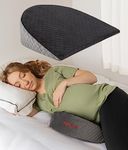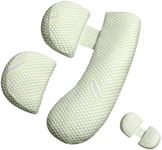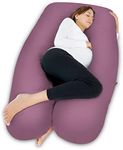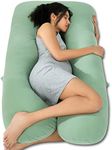Buying Guide for the Best Pregnancy Pillows
Choosing the right pregnancy pillow can make a big difference in your comfort and sleep quality during pregnancy. Pregnancy pillows are designed to support your changing body, relieve pressure, and help you find a comfortable sleeping position. Since every pregnancy and body is unique, it's important to consider your personal needs, sleeping habits, and any specific discomforts you may be experiencing. Understanding the key features of pregnancy pillows will help you make a choice that supports your well-being throughout your pregnancy.ShapeThe shape of a pregnancy pillow determines how it supports your body. Common shapes include C-shaped, U-shaped, wedge, and full-length pillows. C-shaped pillows are great for supporting your back, belly, and knees at the same time, while U-shaped pillows provide support on both sides, which is helpful if you tend to switch sides during sleep. Wedge pillows are smaller and can be placed under your belly or back for targeted support, and full-length pillows are straight and can be hugged or placed between your knees. To pick the right shape, think about your usual sleeping position and which areas of your body need the most support.
SizePregnancy pillows come in various sizes, from compact wedges to large, body-length options. Larger pillows offer more comprehensive support but take up more space in your bed, while smaller pillows are easier to move and store. If you have a smaller bed or share your bed with a partner, a compact pillow might be more practical. If you want full-body support and have enough space, a larger pillow could be more comfortable. Consider your bedroom setup and how much support you want when choosing the size.
Filling MaterialThe filling material affects the pillow's firmness, support, and breathability. Common fillings include polyester fiber, memory foam, microbeads, and natural materials like cotton. Polyester fiber is soft and fluffy, memory foam offers firmer, contouring support, microbeads are moldable and lightweight, and natural fillings are often more breathable. If you prefer a softer pillow, look for polyester or cotton. For firmer support, memory foam is a good choice. If you get hot at night, breathable or cooling materials may be best. Think about your comfort preferences and any allergies when choosing the filling.
Cover MaterialThe cover material impacts how the pillow feels against your skin and how easy it is to clean. Common cover materials include cotton, jersey, and polyester blends. Cotton is breathable and soft, jersey is stretchy and cozy, and polyester blends are durable and often wrinkle-resistant. If you have sensitive skin or get warm at night, a breathable cotton cover may be ideal. Also, check if the cover is removable and machine-washable for easy cleaning, especially if you plan to use the pillow frequently.
Support AreasDifferent pregnancy pillows are designed to support different parts of your body, such as your back, belly, hips, knees, or neck. Some pillows offer full-body support, while others target specific areas. If you experience discomfort in a particular area, like lower back pain or hip pressure, look for a pillow that provides extra support there. Your main discomforts and sleeping habits should guide you in choosing a pillow that targets the areas where you need the most relief.
AdjustabilitySome pregnancy pillows allow you to adjust the firmness or shape by adding or removing filling, or by repositioning different sections. Adjustable pillows can be helpful if your needs change throughout your pregnancy or if you want to use the pillow in different ways, such as for sitting up or nursing after birth. If you value flexibility and want a pillow that can adapt to your changing body, look for one with adjustable features.















